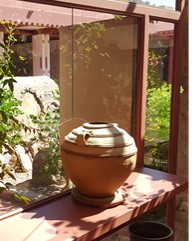Taliesin West – A Window Into Perfection
Frank Lloyd Wright is one of my favorite architects, mostly because he was such a prolific architect of homes and churches, leaving a trail of evidence of his perspective and talent in dozens of neighborhoods around the country. With over five hundred of his nearly one thousand designs having been built, his Prairie style or Usonian houses or elegant chapels are as accessible as they are inspiring. He believed a house should be “of” the place where it sat “on.”

Taliesin West is built into the McDowell Mountain foothills, nestled into the hillside of the sandy Sonoran Desert outside Scottsdale, Arizona. It is quintessential Frank Lloyd Wright.
In addition to learning about the physical structure, or the design and setting of a property, I always appreciate hearing those tidbit stories that reveal something of the character of the people who resided there. The stories can be quaint or endearing, even if questionable as matters of fact. But the tales can be useful tools for insight into the home’s former residents, how they lived, what they valued, how they found inspiration. (As a writer, I’m seeking methods of character development at every turn!)
The story that struck me the most on the Taliesin West tour involved the matter of windows. Frank Lloyd Wright didn’t want them (I don’t blame him!) as he favored the breeze and warm air Arizona offered. Even as he finally acquiesced to the window request from his wife, Olga Lazovich Milanoff, he stood firm against moving a pot sitting on a window ledge. As the story goes, he told his wife and the builders to figure out a solution that didn’t involve moving the pot since its position had a purpose: a perfect pose. Always the master of his own idea of perfection, Frank Lloyd Wright didn’t budge, he stood his ground until the builder (and his wife) had no choice but to find a creative resolution. They allowed the pot to stay in its position and then carved a hole in the window to allow the pot to remain planted in its position as it extended out by an inch or so beyond the window. Looks closely at the photo and you’ll see the top of the cut-out where the pot extends. Problem solved. (I have wondered whether Olga ever inched that pot over to the left or the right when he wasn’t looking to test his observation skills or just to screw with him.)
On the other hand, as a writer, could I ever be that stubborn, that convinced of my penned perfection?
I’m intrigued by this story (regardless of whether true or not). On the one hand, good for Frank Lloyd Wright for standing his ground, although I suspect this stubbornness could be the key to his multiple marriages. On the other hand, as a writer, could I ever be that stubborn, that convinced of my penned perfection? With approximately one million words in the English language, could I convince myself so fully that I had chosen the most perfect specimens and put them in the exact combination to structure a sentence so perfectly that no other permutation of words would do? All of the craft lectures and books I’ve consumed would warn against this stubbornness in the revision process (think: kill off the darlings!) I believe writers develop a sense of what is critical to the story, what must stay and what can go, what represents a character’s voice and what muddies it. But what drives that sensibility? Is it only what serves the story or is there the matter of what is stylistically serving the character’s voice or the story’s setting or overall tone or metaphoric pursuits or any number of other factors?
If stubbornness were put on a spectrum and applied to my daily scenarios, I would plot my interactions with my husband at the most extreme stubborn point (and he would agree), while my writing would land on the opposite end, a fluid process of seeking and probing for that perfection but never quite achieving a point that it would require a carved-out window for my words to flourish in the sunlight.



You hit the nail on the head !!! Maybe you need to be a little more stubborn and believe you might just have the “perfect “ words. (Especially when it comes to writing a great book )
Signed,
The average reader
?